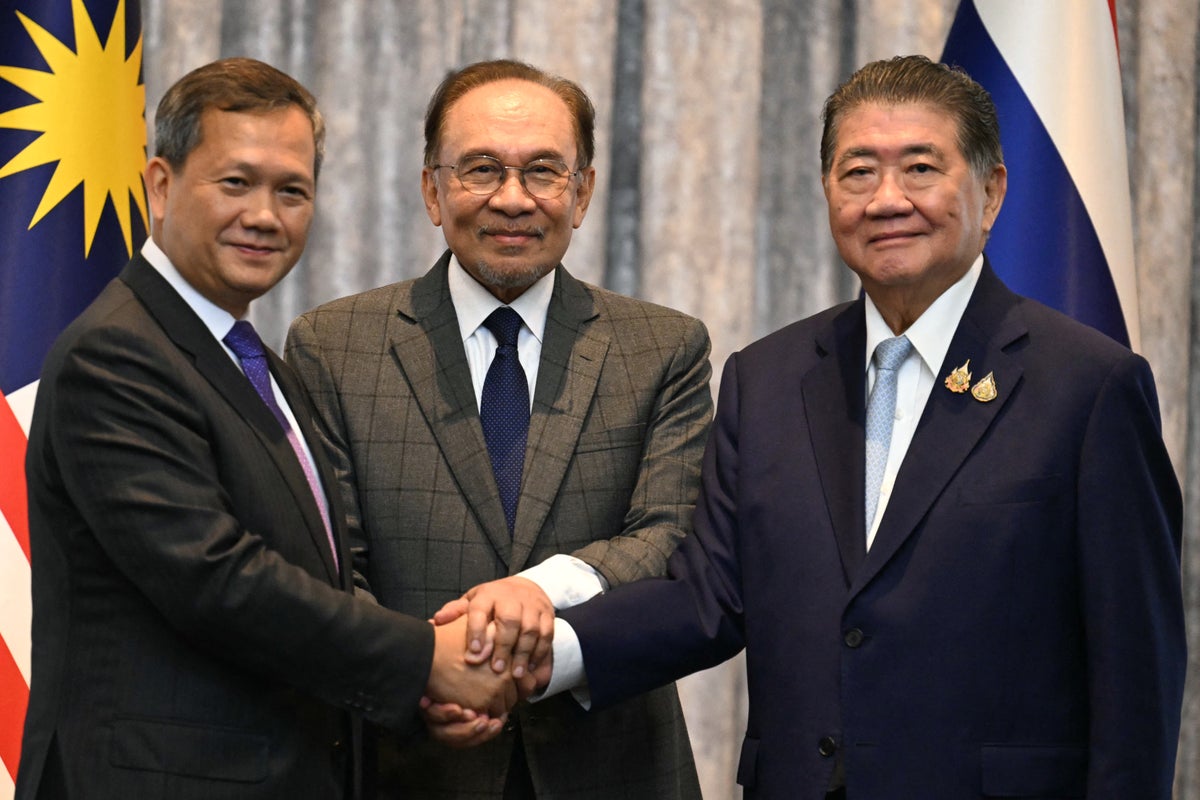Thailand and Cambodia on Monday agreed to an “immediate and unconditional” ceasefire to end their deadliest conflict in over a decade after five days of fighting.
Malaysian prime minister Anwar Ibrahim, who mediated the ceasefire talks between Cambodian leader Hun Manet and Thai acting premier Phumtham Wechayachai, said the truce would take effect at midnight on Tuesday.
The two leaders held a joint press conference with Mr Anwar after reaching the deal, concluding it with a brief handshake.
Mr Hun Manet expressed confidence that the agreement would “provide a lot of opportunities for hundreds of thousands of people on both sides to return to normalcy”.
“Today we have a very good meeting and very good results,” the premier said, adding that they hoped “to stop immediately the fighting that has caused many lives lost, injuries and also caused displacement of people”.
“We hope that the solutions that Prime Minister Anwar just announced will set a condition for moving forward for our bilateral discussion to return to normalcy of the relationship and as a foundation for future de-escalation of forces,” he added.
Mr Wechayachai said he agreed to a ceasefire “in good faith” and that Bangkok was committed to peace with its neighbour.
Mr Anwar, current chair of the Asean regional bloc, facilitated the dialogue to which Washington and Beijing sent envoys.
The talks marked the first formal dialogue between the warring Southeast Asian countries since the conflict began on 24 July. The fighting killed at least 35 people and displaced over 200,000 on both sides of the disputed 800km border.
The five days of fighting saw the use of heavy artillery and airstrikes, with each side accusing the other of firing first in the conflict.
The ceasefire agreement commits Thailand and Cambodia to resuming direct communication between their premiers as well as foreign and defence ministers.
In addition, according to a press release issued after the talks, the agreement tasks the defence and foreign ministers of Malaysia, Cambodia and Thailand to establish a “detailed mechanism” to oversee the “implementation, verification, and reporting of the ceasefire”.
In the meantime, the military commanders of the two countries will hold an “informal meeting” at 7am on Tuesday.
The ceasefire deal came a day after American president Donald Trump said he had threatened Thailand and Cambodia with tariffs to bring them to the negotiating table and end hostilities.
Thailand had initially rejected third-party negotiations in the conflict.
“I called the prime minister of each and said, ‘We’re not going to make a trade deal unless you settle a war.’ I think they want to settle,” Mr Trump said after making separate calls to Mr Wechayachai and Hun Manet during his trip to Scotland.
While Cambodia agreed to support an unconditional end to hostilities, Thailand stressed on the need for “sincere intention” from its neighbour and that any ceasefire must include troop withdrawals and an end to the use of lethal force.
Thailand’s economy is heavily dependent on exports to the US and Bangkok has avoided vexing Mr Trump while negotiating with Washington to cut down the newly imposed 36 per cent import levy.
Thailand has been engaged in trade talks with the US in recent weeks, offering expanded access for American goods in a bid to reduce its $46bn trade surplus.
In contrast, neighbouring countries like Indonesia, Vietnam and the Philippines have already finalised trade agreements with Washington.
Mr Trump previously claimed he had used the threat of tariffs to get India and Pakistan to end their four-day military conflict in May, an assertion rejected by Delhi but acknowledged by Islamabad.

